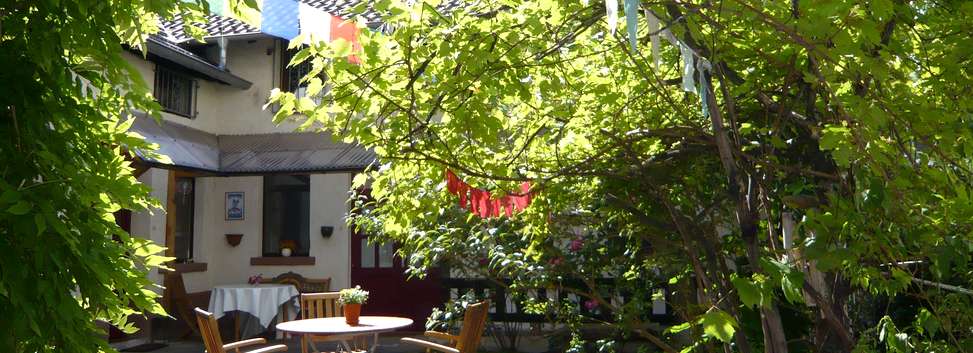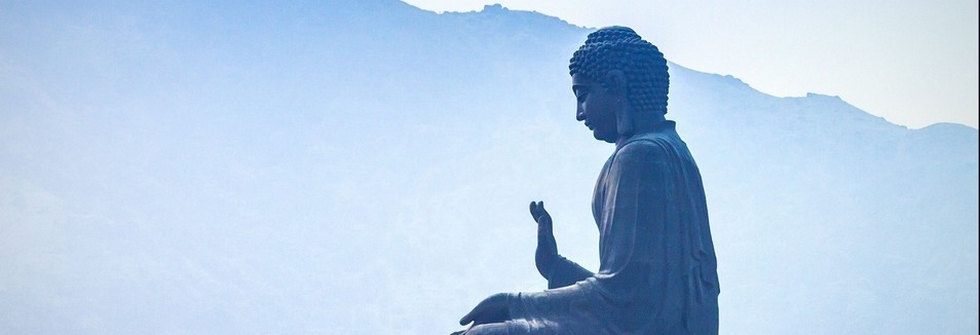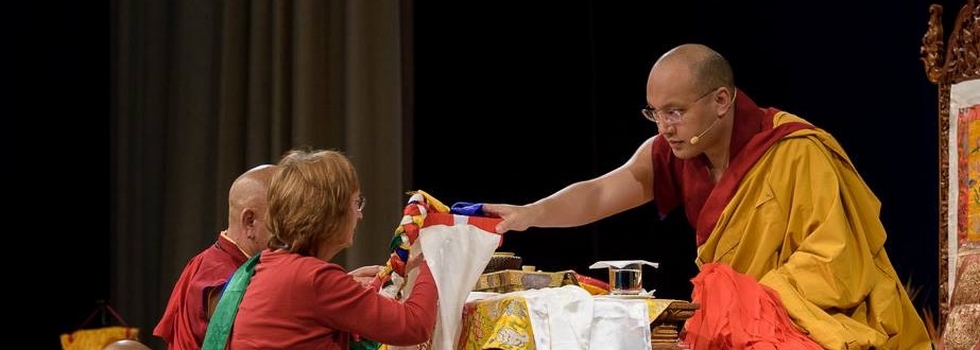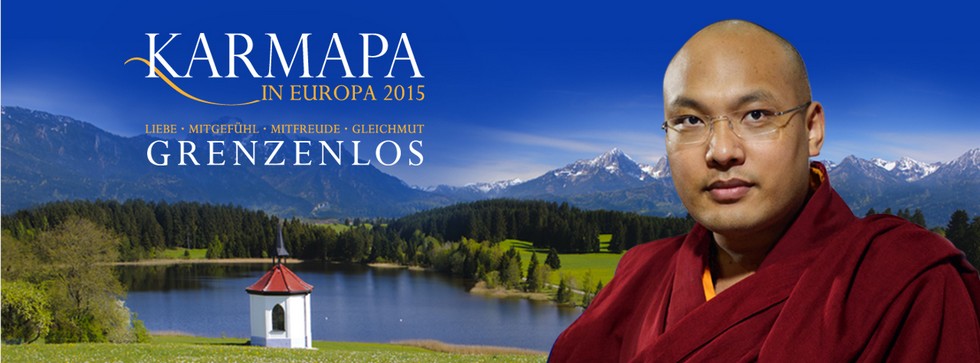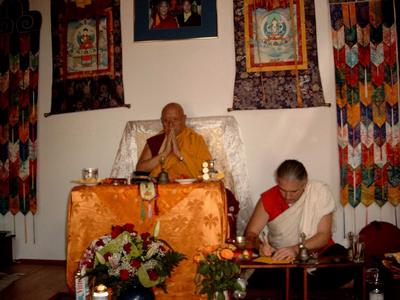
Confidence and Devotion
When receiving precious Dharma instructions, especially from the Great Vehicle, it is very important to arouse the pure motivation, bodhicitta, which is the altruistic intention to attain enlightened mind for the benefit of every living being.
Before studying and practicing more advanced instructions it is necessary to recollect the fundamental teachings and to be sure that one has understood them sufficiently and correctly. Every Dharma activity presupposes an unblemished appreciation of the basic instructions that Lord Buddha gave to us. For example, any skyscraper that is erected without a fundament will collapse in a storm. It is the same with Dharma: It is only possible to progress in one's practice if one understands and has integrated the basic instructions in one's life. It is tempting to think that one has understood them well, but students falter if they don't have a good foundation and skip stages while hoping to achieve beneficial results.
The ground of our being is our life. As disciples of Lord Buddha's teachings, our life is more precious than an ordinary human existence. We all have obtained a free and endowed human life that is so hard to obtain. The fact that we have the possibility to study and practice the Buddhadharma now is due to our accumulation of virtue in past lives. It is extremely difficult to engage in so much virtue so that one actually obtains a 'precious' life. If we neglect any opportunities that we have to practice the Dharma, then we will have wasted our life. Ancient sacred texts state that wasting one's invaluable opportunities is like returning empty-handed from an island filled with jewels. If one ignores the occasion to turn one's attention towards the Dharma and does not give up samsaric ways, then one's life will be wasted. A wasted life is like reading a prescription and not taking the medicine a doctor prescribes when one is very sick. Many examples are presented in the sacred texts; they point to the fortunate opportunities we all have and urge us not to waste our time with meaningless endeavours. Shantideva never grew weary of reminding us in the Bodhicharyavatara how rare and precious our human life is.
Let us bring the millions and billions of people living on earth to mind. There aren't many who practice altruism, but there are so very many people who only think of themselves, live at the expense of others, and simply couldn't care less that others suffer. Also, there are many people who think that there is nothing wrong with killing or that dying for a cause is their personal ladder to heaven. In fact, these people are only bringing pain and suffering to themselves and others and are accumulating very negative karma; they will hardly have a chance to learn and practice the Dharma as a result. And only few people meet a spiritual master who inspires them to immediately give up their ugly activities.
Jetsun Milarepa, for instance, was meditating in a cave in North Nepal when a hunter passed by. The hunter, known as Sherab Dorje, demonstrated how to waste life away. It so happened that from a distance Milarepa saw him and his hound chasing a deer he had already shot with his arrow and how they devoured the poor deer when it collapsed and died. One day the hunter ran into Milarepa, who sang a song of realization to him. Jetsun Milarepa told him that there would be no end of the mental and physical suffering he would experience in a next life due to his sordid actions, that he would have no opportunity to escape, and that he should stop harming living beings. The hunter dropped his bow and arrow and immediately dedicated his life to the Dharma. He became one of Milarepa's main disciples and attained realization in that very same life. Sherab Dorje is truly an exception.
It is recorded in another text that the deer that was wounded and chased by Sherab Dorje and his bloodhound came to Milarepa. The story tells us that Milarepa was sitting on a cliff outside his cave and meditating quietly. The wounded deer came to Milarepa and lay down at his feet, breathed peacefully, and experienced relief. Then Sherab Dorje's hound arrived - it was panting frantically from having run up the mountain, foaming at the mouth, the blood of other animals it had devoured still dribbling from its jaw. The hound was very aggressive, suddenly became timid, and lay down at the side of the deer. Shortly afterwards Sherab Dorje managed to climb up the steep mountain path to Milarepa's cave - he was sweating and totally out of breath. When he saw the wounded deer and his vicious bloodhound lying side-by-side at the feet of Milarepa, he was furious, pointed his bow and arrow at Milarepa, and shouted, 'You disgraceful magician. What have you done? You have turned my bloodhound into a gentle lamb that is supposed to kill animals for me. Who do you think you are?' He was about to shoot Milarepa, who remained calm, pointed his finger at him, and said, 'This deer and hound are not enemies. You are the one who sets them against each other. When they are free of their fear of you, then they can live together peacefully. Don't you see how wicked you have turned out to be because of your past evil deeds and how mean you are when you hurt others so cruelly? Don't you see their pain? How would you feel?' It took a while for Sherab Dorje to realize that he had wasted his life by only causing defenceless living beings horrendous pain. Finally Sherab Dorje admitted and regretted his actions. He requested, 'Yes, you are right. I have been bad. What can an uneducated person like me do to purify all negative karma that I amassed and to pursue freedom?' Milarepa answered, 'I can give you the instructions. They are called Mahamudra and the Six Yogas of Naropa. You have to take advantage of the opportunity right away. Just telling you about them will not help. You have to practice the teachings until the end of your life.'
After Sherab Dorje realized that there was much to do, he said to Milarepa, 'Let me give you the little that I own as an offering for the Dharma teachings. Let me offer the deer and hound to you. Let me give you my bow, arrow, and hunting bag, too.' Milarepa replied, 'What makes you think that you can give me the deer that doesn't belong to you?' And he set the deer free. Milarepa continued, 'Sure, you may have raised the dog, but what gives you the right to rule over him?' And he set the dog free. When they were alone, Milarepa took the bow, arrow, and other things Sherab had given him and threw everything into the sky. All objects miraculously landed on a high mountain - the bow is still there and can be seen to this day. Milarepa told Sherab, 'I don't need any offerings. I am a yogi who has renounced worldly ways and have no attachment to possessions. All I need is fresh water, a little to eat everyday, and a place to lay down to sleep. There is more than enough for me here. Keep what you need for yourself so that you can practice the Dharma.' Sherab Dorje had even more confidence and devotion now and replied, 'That is how it should be. Let me return to my family just once and inform them that I have decided to dedicate my life to learning and practicing the Dharma.' Milarepa responded, 'You shouldn't, because it is likely that you will change your mind. Maybe I won't be around when you return - there is nothing to keep me here. If you are serious about practicing the Dharma, you must start right away.' Sherab was confident and had devotion, stayed, received instructions on developing and integrating loving kindness and compassion in his life, practiced diligently, and became one of Milarepa's closest disciples. We learn that when he was old and ready to leave his body, then - like Milarepa's other closest disciples - Sherab Dorje left no bodily traces, which means to say that he attained realization. He has come to be known as Sherab Repa the Hunter.
Loving kindness and compassion are the essence and practice of all Kagyupas and Tibetan Buddhists; it is practiced by all those who follow in the footsteps of Jetsun Milarepa, up and until the present day. It would be good for you and very beneficial for your family, friends, and society to base your studies and practices on what is called 'the awakened heart.'
The First Gyalwa Karmapa, Düsum Khyenpa, was a realized Buddha who demonstrated the path for the benefit of all disciples in his life. Free of preferences and without impediments, he focused one-pointedly on loving kindness and compassion. Due to his kindness, we can learn details and steps of practice by receiving instructions from a qualified Lineage-Holder and by reflecting the meaning deeply. Intellectual understanding alone won't do. We need to meditate and integrate the teachings in life. We cannot err if we follow each step by listening, reflecting, and meditating the instructions in reliance upon our spiritual master's instructions.
The First Gyalwa Karmapa manifested the awakened heart during his entire life and set an example for his disciples. His main teacher, Dagpo Pobawa, told him that he would advance quickly and attain fruition if he meditated in specific places, which he did, and this prophecy came true. Düsum Khyenpa became the founding forefather of the Lineage of Karmapas. He incarnated as the proceeding Karmapas, again and again, in order to work for the benefit and welfare of all living beings.
The Lineage of Karmapas did not arise in Tibet. Ancient texts tell us that he lived many lives in India, studied and practiced the Dharma many times, perfected the practices more and more, and attained realization before he manifested the glorious activities of the Karmapas. Astrological texts prophecy that the Gyalwa Karmapa will manifest as the Sixth Buddha of our world cycle and will be named Drukpa Sengge, 'The Lion's Roar.' Buddha Shakyamuni was the Fourth manifestation in the succession of a thousand Buddhas who will appear. Glorious Karmapa, Ogyen Trinley Dorje, will manifest as the Sixth Buddha.
Gyalwa Düsum Khyenpa had many disciples who came to him because they had heard of his astounding wisdom, the reason he is called Düsum, 'Knower of the three times.' One of his disciples was Drogon Rechen. He had studied with many teachers and had immense knowledge and realizations from practicing in solitude. His name was Rechen, because he only wore a cotton cloth. He still needed pointing-out instructions from a highly realized spiritual master in order to completely perfect realization of mind's true nature.
Drogon Rechen was on pilgrimage and met other pilgrims; they exchanged news and gave each other tips. A few had heard about Düsum Khyenpa and felt sincere confidence and devotion just from hearing about him. They spoke about his wonderful activities and told each other, 'The best thing that can happen to anyone is to meet him.' While listening to the pilgrims' conversation one evening, Drogon Rechen's hair stood on end and tears rolled down his cheeks when he heard the name Düsum Khyenpa. Upon having merely heard Düsum Khyenpa's name, Drogon Rechen immediately knew, 'He is my teacher. I have a karmic connection with him from many past lives. I will do everything to find him and receive teachings from him.' Determined, it didn't take long for Drogon Rechen to meet Düsum Khyenpa, who was not called Karmapa at that time.
Düsum Khyenpa didn't accept Drogon Rechen as a student right away but put him through tests first. Then he imparted all teachings that he had received from his teachers. He didn't withhold anything and gave Drogon Rechen all empowerments by, as written in texts, 'pouring milk into the pure crystal vase' - the one who was closest to his heart. Drogon Rechen became Düsum Khyenpa's main disciple and Lineage-Holder. He passed the wisdom lineage of the Kagyu - 'The Golden Rosary' - that he had received from the First Karmapa to the Second Karmapa, Karma Pakshi.1
Before finding Düsum Khyenpa, Drogon Rechen met a pupil of one of his disciples and asked him, 'Where can I find this great master? He is my teacher. If you know where I can find him, please show me the way.' The pupil responded, 'Hm, I really don't know where he is. You should ask my teacher, who is his direct disciple.' Drogon Rechen was very happy and asked, 'Where can I find your teacher?' The pupil pointed to the mountain and answered, 'He is meditating in a cave up there. Go and ask him. Maybe he will even take you to Düsum Khyenpa.'
The climb up the mountain was very strenuous and when Dogon Rechen reached the cave, he didn't see anything but a pond inside. He was confused, looked around, only saw a dish and a few utensils, but no Lama. Disappointed and frustrated, he turned around to leave and accidentally kicked a rock lying at the entrance of the cave into the pond. He returned to the pupil in the valley and told him about his failure. The pupil said, 'I don't know what happened, but my teacher is up there. Give it another try. Maybe you will see him this time.' Drogon Rechen thought that maybe he had looked in a wrong corner of the cave and climbed up the steep mountain again. When he reached the cave, he didn't see the pond inside but the Lama with the rock he had accidentally kicked into the pond in his lap. Bewildered, Drogon Rechen asked him, 'What happened? Are you the Lama?' He answered, 'Yes.' Drogon Rechen told him, 'I was here just a little while ago and did not see you.' The Lama responded, 'I was here, resting in meditative absorption. I imagined that my body had dissolved into water. And then you came along and threw a rock at me. Here it is, take it.' Drogon Rechen experienced unwavering confidence and devotion and prostrated many times to the Lama in the cave. He told the Lama, 'Please, don't think I'm arrogant. I didn't come here to receive instructions from you. I went to all this trouble to ask you to tell me how I can find Düsum Khyenpa, your teacher, who is renowned and is my master, too.' The Lama answered, 'No problem. I will show you where he is and take you there.' Drogon Rechen was joyous that he would be led to Düsum Khyenpa and need not search far and wide anymore. He turned around and saw the Lama spread out his arms and elevate into the sky, using the sleeves of his garment as wings. He beckoned to Drogon Rechen below and said, 'What's the matter with you? Come on. Let's go.' Of course, Drogon Rechen could not follow the Lama, who gave him a pitiful look that seemed to say, 'Can't you fly?' Drogon Rechen still had a bit to learn, so he begged the Lama, 'Please, let's walk.' They started the journey and joined other disciples with the same destination. It took them a few days to be together with the Gyalwa Karmapa.
There are many episodes in the life-stories of the Kagyu forefathers that tell us about disciples' sincere confidence and devotion in the precious Dharma. Thank you very much.
May virtue increase!
Presented at Theksum Tashi Choling in Hamburg, July 2007. Based on the German rendering kindly offered by Thomas Roth, translated into English and edited by Gaby Hollmann, with sincere gratitude to Madhavi Simoneit and Ani Dorothea Nett.
The Kagu Office of His Holiness the Seventeenth Karmapa (online) tells us that 'The forefathers in the Kagyu Lineage are known as the 'Golden Rosary.' The lineage of the Kagyu emphasizes the continuity of oral instructions passed on from master to student. This emphasis is reflected in the literal meaning of 'Kagyu.' The first syllable 'Ka' refers to the scriptures of the Buddha and the oral instructions of the Guru. 'Ka' has the sense both of the enlightened meaning conveyed by the words of the teacher as well as the force that such words of insight carries. The second syllable 'gyu' means lineage or tradition. Together, these syllables mean 'the lineage of the oral instructions.'' The Kagyu Lineage has been passed on from mouth to ear for many centuries.






